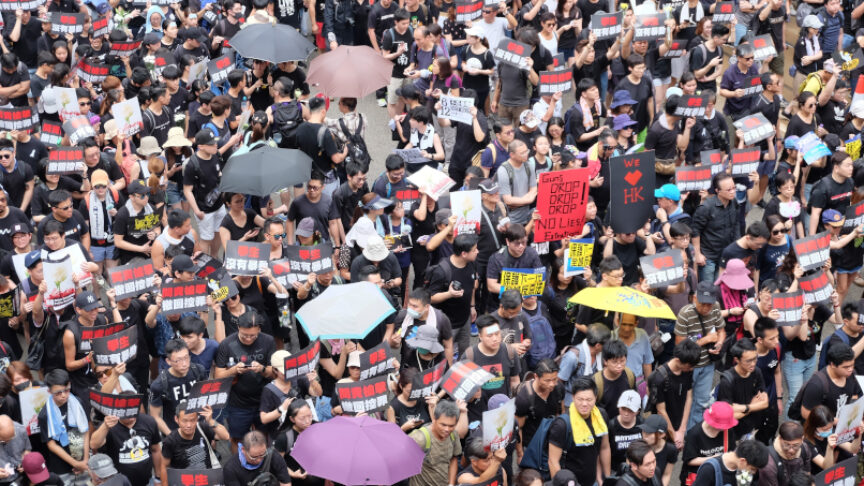Europe, China, and Hong Kong: Why new red lines will be worth the cost
The business relationship has long dominated Europe-China relations. But the recent developments in Hong Kong show that Beijing’s increasingly aggressive policies should force a rethink.
In announcing plans to bypass Hong Kong’s legislative council and impose a national security law on the Special Administrative Region, Beijing last week not only took a decisive stance against democratic processes and civil liberties, it also told the world it believes international legal obligations to be optional. The move is no accident; it was deliberate, and it was timed with purpose. And Beijing appears to judge the short-term consequences to be worth the long-term gains.
The situation in Hong Kong has been a significant annoyance to the Communist Party for years. The persistent protests by millions of residents of the Special Administrative Region (HKSAR) against infringements on guaranteed freedoms represent a challenge to the central authorities and have been drawing unwelcome international attention on and off for years. The Chinese Communist leadership cannot allow itself to appear weak in the face of popular pressure. So it decided to act.
Last week a draft law was presented to the National People’s Congress, China’s quasi-parliament, which convenes in Beijing this week. Its aim is to “prevent, stop and punish any act occurring in the HKSAR to split the country, subvert state power, organise and carry out terrorist activities and other behaviours that seriously endanger national security, as well as activities of foreign and external forces to interfere in the affairs” of Hong Kong.
Officials hastened to point out that the new regulation will apply only to a very small group of people – those instigating violence and calling for independence for Hong Kong from China. It will have no impact on Hong Kong’s attractiveness as a business location, they maintained. But the reality will likely be very different.
Beijing has upped the ante – and seems to be calling the West’s bluff.
Imposing this law means creating the structural basis for the national authorities to undertake unprecedented control and surveillance in Hong Kong. It will effectively eliminate the guaranteed rights and freedoms of Hong Kong’s more than seven million citizens. The fact that the central government in Beijing is now forcing through a law that legally should go through Hong Kong’s own legislative processes makes a full reversal of the decision virtually impossible. In 2019, a law on extradition to the mainland prompted millions to take to the streets, and was proposed by Hong Kong’s own authorities, which were eventually forced to completely withdraw it. A similar process is hard to imagine now, even with massive international support for protestors. Beijing has upped the ante – and seems to be calling the West’s bluff.
Both international and Chinese companies have long benefitted from the framework of ‘one country, two systems’. It has allowed business to take place outside the direct access of Beijing’s tight authoritarian control of people and capital on the mainland. For decades Hong Kong has enjoyed special privileges in international trade and has thus been one of Asia’s most vibrant economic and financial hubs. Beijing’s alteration of the status quo will likely provoke a US response in the form of sanctions against China or the cancellation of Hong Kong’s special economic privileges. The attempt to turn Hong Kong into just another Chinese city will no doubt hurt Chinese businesses and elites, but it will likely hurt Western companies even more, as they have long relied on Hong Kong’s excellent business conditions as an invaluable gateway to the Chinese market.
Amid the global pandemic and rising US-China tensions, the push on Hong Kong was foreseeable, but still somewhat unexpected. The Chinese government has likely judged that now is the perfect time to complete some unfinished business. China is intensifying its patrols and creating new administrative structures in the South China Sea. It has increased sabre-rattling towards Taiwan. And Chinese military forces have reportedly entered into Indian territory along the Sino-Indian border, where stand-offs and limited skirmishes have lately occurred on a more regular basis. While the coronavirus has effectively pressed the pause button on the world economy, China’s policymakers have hit fast-forward on restoring ‘territorial integrity’ and dominance in Asia. For Europe, this comes at the worst possible moment.
The European response so far has been timid. In recent years European Union member states have generally refrained from drawing red lines when it comes to their dealings with China: a million people in “re-education” camps in Xinjiang; assertive claims in the South China Sea; a massive expansion of the military; disinformation and influence campaigns in Taiwan and beyond – none of these things have fundamentally altered Europe-China business relations. The central government’s latest step could be a game-changer, but the European toolbox will remain relatively empty if member states are not willing to risk their broader relationship with China.
The current global economic turmoil may be a good moment for Europeans to reflect on the full extent of the changes the geopolitical landscape has undergone. The increasingly assertive role of the Communist Party cuts to the very question of whether China will abide by set rules in the future.
More than 200 cross-party parliamentarians from north America, the United Kingdom, the Asia-Pacific, and Europe have called out China’s breach of its international legal commitments on Hong Kong in a joint letter. This rare display of democratic unity is a positive example of speaking up against authoritarian overreach. Beijing knows that its current approach will come at a cost. But Europe can jointly act with like-minded partners to at least drive up the price – to mitigate some of the fallout for the people of Hong Kong and to deter future aggression. Defining red lines might help after all.
The European Council on Foreign Relations does not take collective positions. ECFR publications only represent the views of their individual authors.



